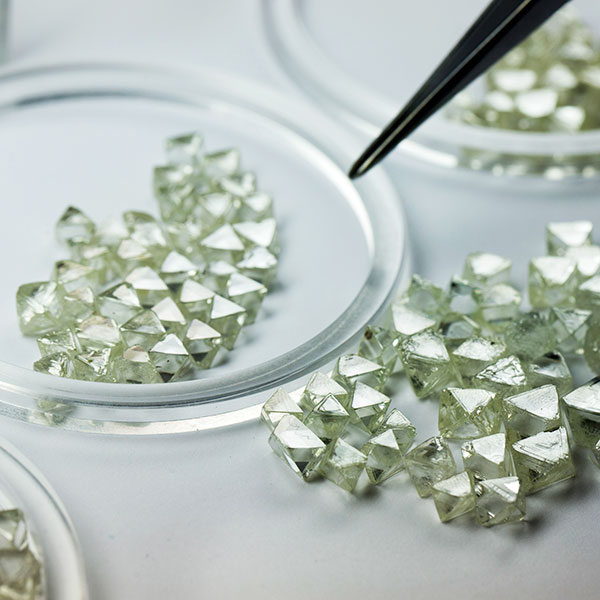
Last week, Russian diamond producer Alrosa unveiled a fascinating new product, a diamond that can be marked with a photo or even music, all part of its larger plan to use nanotechnology to trace diamonds.
It’s the kind of clever innovation we have come to expect from the miner, which recently announced a slew of positive news. It’s experimenting with carbon capture to lower its eco-footprint and has released its latest sustainability report. In December, Alrosa signed a cooperation agreement with Antwerp World Diamond Centre. Like most diamond miners, it enjoyed a great 2021—excellent news for its investors, including the Oregon Public Employee retirement fund.
But all that might not mean much right now, as the Russian-Ukraine crisis has, fairly or no, put it and other Russian companies under a cloud.
Alrosa has always been proud of its Russian origin and overall social impact and has suggested that could be a selling point. But Alrosa is not just a Russian company, it is 33% owned by the Russian government, with another 33% owned by the local government of Sakha (Yakutia), the republic that houses its diamond mines. Its CEO, Sergey Ivanov Jr., is the son of Putin’s sanctioned former chief of staff. And with all sorts of Russian entities facing all sorts of penalties, it’s certainly conceivable that Alrosa could end up on the verboten list.
(There’s also a smaller Russian diamond producer, Grib, which is currently owned by VTB Bank. That bank has also been mentioned as a possible sanctions target.)
All that said, Alrosa was not included on the list of the sanctioned entities announced Tuesday, though two prominent Russian financial institutions were.
With the Biden administration threatening a hard line against Russia, and warning more sanctions may be coming, the Jewelers Vigilance Committee (JVC) recommends that any U.S. citizen who does business with Russia, even indirectly, should take precautions and check the U.S. Office of Foreign Assets Control (OFAC) list to determine if they are dealing with prohibited companies.
“U.S. businesses should evaluate whether any of their suppliers or customers are using bank accounts connected to [sanctioned] financial entities and if so, immediately cease transacting with those accounts,” said a recent JVC note.
This issue has come up in the past, but Alrosa is generally not mentioned when analysts speculate about sanctions. While Russia is a major diamond producer, that’s not what the country is known for, and the miner is far from the biggest contributor to its economy. According to a 2020 Congressional Research Service list, Alrosa is the 48th largest company in Russia, just above the local branch of Philip Morris.
It is also highly unlikely that the Kimberley Process (KP) would get involved here—as some emails I’ve received have suggested—given the KP has a very specific and limited definition of conflict diamonds that pertains only to rebel forces. Even some of the broader definitions being bandied about make clear that the KP covers only diamond-related human rights issues and conflict, and diamonds aren’t a factor in the Ukraine conflict. Finally, the KP needs absolute consensus to take action, which is unlikely when talking about Russia.
That said, U.S. and European Union sanctions are a far greater, and realer, threat, and the longer this crisis drags on, the greater chance that Alrosa will land in the line of fire.
(Before this turns into another tiresome and counterproductive lab-grown– versus–natural argument, let’s note that several Russian companies produce lab-grown diamonds, the Russian government has invested in a lab-grown business, and the Chinese military is a significant lab-grown diamond producer.)
Alrosa didn’t respond to a request for comment, nor did its U.S. office, which was established in 2018. That same year, Alrosa’s vice president of sales, Evgeny Agureev, told JCK that, if the company ever were subject to sanctions, it would find a way to cope.
“If [there’s] negative impact from sanctions, we will change our business model,” he said. “We see a lot of other opportunities from other regions.”
Still, sanctions are certainly not something that Alrosa would likely want, and it’s something that could cause chaos in the diamond industry, given that it’s still quite difficult to track diamonds—though Alrosa’s new nanotechnology project seems among the most advanced methods out there. It’s not widely available to the market yet, but it would certainly be ironic if Alrosa’s nano-vation ends up being used against itself.
Top: Alrosa rough (photo courtesy of Alrosa)
- Subscribe to the JCK News Daily
- Subscribe to the JCK Special Report
- Follow JCK on Instagram: @jckmagazine
- Follow JCK on X: @jckmagazine
- Follow JCK on Facebook: @jckmagazine






